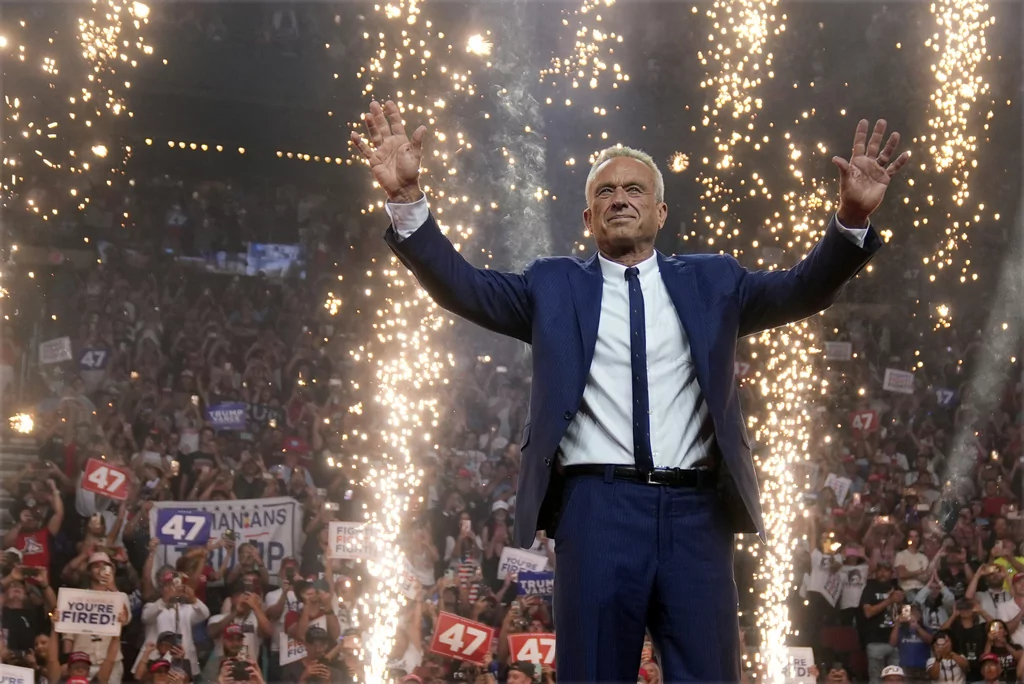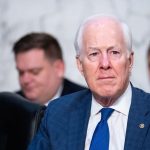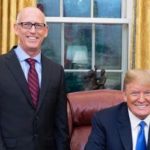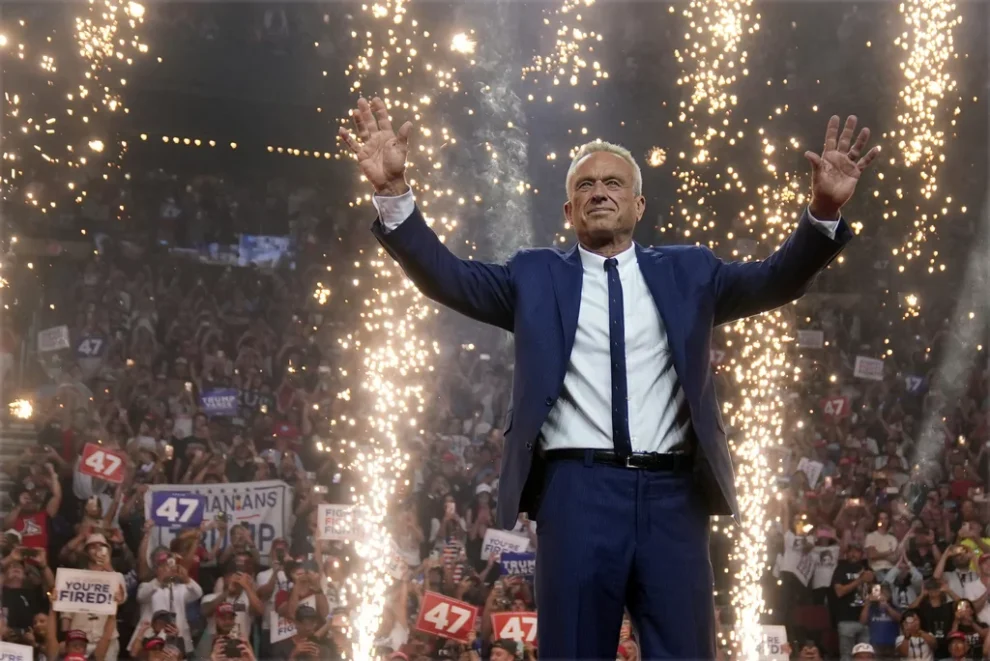Robert F. Kennedy Jr. and his allies are spinning a web to bring their vision of “Make America Healthy Again” to life in 2024, should former President Donald Trump win a second term in the White House.
During the sixteen months he spent on the campaign trail, stumping first as a Democratic candidate for president and then as an Independent, Kennedy’s warnings about the chronic disease “epidemic” sweeping over the country found an audience with many disillusioned voters. His concerns most prominently found a listening ear with Trump, his one-time rival, after the Kennedy scion suspended his campaign to endorse the former president last month.
“President Trump has told me he wants this as his legacy,” Kennedy announced in August.
He told supporters he believed his dreams of saving the lives “of countless children” and reversing “this country’s chronic disease epidemic” had found a champion in his former rival.
Kennedy endorsed Trump during an Arizona rally and introduced a new slogan to the Make America Great Again movement.
“Don’t you want a president that’s going to Make America Healthy Again?” he asked the cheering arena, adding the MAHA catchphrase to the MAGA repertoire.
“We want every child in America to grow up and to live a long and healthy life,” Trump told his base with Kennedy by his side.

Having Trump’s support, who could be the sitting president of the United States in 2024, is one thing. Expanding advocates in the legislative branch could entail even greater implications for the MAHA movement.
Calley Means, a healthcare professional who attended Stanford University, Harvard University’s Business School, and served as one of the key architects behind Kennedy and Trump’s truce, is working to do just that. In an interview with the Washington Examiner this week, he explained how the MAHA agenda could be implemented.
Means is a critical Kennedy ally who has worked with his sister, Casey Means, to lobby top political players to support crucial health reforms. The two authored the bestseller Good Energy earlier this year, and Calley Means, in particular, has been credited with advising both the Trump and Kennedy camps on health policy.
At times, he appears to be the bridge the two men rely on to carry out common goals.
“With the help of @RealDonaldTrump I will work with @calleymeans to end the mental health crisis in America. #MAHA,” Kennedy said in a post to X near the end of August.
With the help of @RealDonaldTrump I will work with @calleymeans to end the mental health crisis in America. #MAHA https://t.co/bQjNDwZI6c
— Robert F. Kennedy Jr (@RobertKennedyJr) August 27, 2024
Lobbying Congress for support is a significant component of laying the groundwork to activate the MAHA agenda. Calley Means, along with his sister, who also attended Stanford, has conducted dozens of meetings with members on both sides of the aisle in the House and the Senate as the new health movement takes shape. The duo have met with “at least 50” members in the upper and lower chambers and will meet with over 100 lawmakers before the end of the year.
Calley Means said he’s observing increasingly widespread support on Capitol Hill for ending the “corporate capture” of key federal health agencies that Kennedy allies believe are responsible for making children “the unhealthiest, sickest children in the world.”
Due to increased congressional interest in health reforms, which Trump vowed to press forward, Calley Means told the Washington Examiner that a congressional hearing on chronic disease is in the works for September.
Calley Means said many of the congressional members he’s in talks with feel as if “they’ve been lied to by the medical industry–they’re shocked by the rates of chronic disease that are going up and how we’re spending more and more money on healthcare and getting sicker and sicker.”
“I think bipartisan members of Congress and Senate I talked to feel misled and let down by the system and are looking for answers,” he continued.
While Democratic lawmakers are unlikely to publicly support bipartisan health reforms ahead of the election, Sens. Ron Johnson (R-WI) and Rand Paul (R-KY) have supported some of Kennedy’s dreams in the upper chamber. Rep. Chip Roy (R-TX), a key GOP voice in the lower chamber, told the Washington Examiner last week that working with Kennedy on health policy will be one of his top priorities going into the next Congress.
Back in 2017, Trump appeared to backtrack on plans to have Kennedy lead a commission on vaccine safety. This time around, his allies appear more confident that the political tides have turned in favor of a lasting partnership between the two men.
The 2017 fallout predated the COVID-19 pandemic, which shook many people’s faith in healthcare leaders. It also came before Kennedy launched a sixteen-month campaign explaining to voters why he believes powerful federal agencies such as the National Institute of Health and the Federal Drug Administration have sold out to big corporations and pharmaceutical companies, which wrecked the country.
At the height of his presidential campaign, Kennedy garnered roughly 15% of support from the U.S. electorate, gaining unusually high traction for a third-party candidate and indicating that his message resonated with a significant chunk of voters disillusioned with the status quo.
At times, Kennedy’s distrust of the healthcare establishment sounded similar to Trump’s MAGA movement, which was fueled in part by suspicion of institutions he and his base felt had gone awry.
During a Fox News interview on Aug. 24, Calley Means noted that “this populist frustration with our institutions” is “what’s been propelling RFK, what’s been propelling Trump.”
Thank you @RCamposDuffy + @calleymeans: Let's Make America Healthy Again.
https://t.co/QYWB58DeN7
— Robert F. Kennedy Jr (@RobertKennedyJr) August 24, 2024
MAHA leaders warn top government health agencies are receiving royalties from pharmaceutical corporations for the drugs they approve, creating perverse incentives. They point to data showing nearly half of the FDA’s budget comes from “industry user fees” or big “pharma,” as Calley Means puts it, to argue that conflicts of interest in the institutions created to safeguard the country’s health
“A sick child is the best thing for the pharmaceutical industry,” Kennedy claimed in August. “When American children, or adults, get sick with a chronic condition, they are put on medications for their entire life.”
“These agencies, the FDA, the USDA, the CDC, all of them are controlled by huge for-profit corporations,” he continued. “75% of the FDA’s funding doesn’t come from taxpayers. It comes from pharma. And pharma executives and consultants and lobbyists cycle in and out of these agencies.”
Means has goals such as expanding Health Savings Accounts to give people more flexibility and autonomy in managing their health and rooting out conflicts of interest on federal nutrition advisory committees in a bid to eliminate corruption from medical guidelines.
“A real effort, a bipartisan effort, is really focusing on getting corruption out,” he noted.
Kennedy has voiced similar concerns about eliminating perverse incentives from regulatory agencies.
As Kennedy and his allies spearhead the MAHA campaign for Trump, speculation has swirled that he could serve in a role, such as Secretary of Health and Human Services, should the former president clinch a second term. Calley Means downplayed the rumors as he looks to 2024.
CLICK HERE TO READ MORE FROM THE WASHINGTON EXAMINER
“From my small vantage point, the entire conversation is about macro concerns and moving the country forward on childhood chronic disease, not horse trading,” he said.
“What I think they’re talking about is much wider than any position,” Calley Means noted.
























